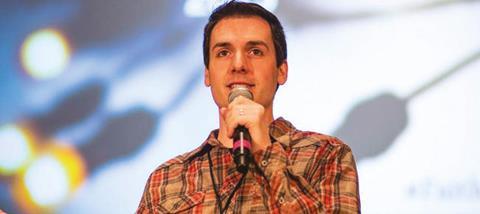Dave Csinos is assistant professor of practical theology at Atlantic School of Theology and the founder of Faith Forward, an ecumenical organisation for innovation in children’s and youth ministry. He spoke to Jamie Cutteridge about teaching methods, experiential moments and his recent research

Jamie Cutteridge: Tell us about your childhood…
Dave Csinos: I was raised in the Roman Catholic Church, and grew up in a smallish parish. I never enjoyed going to Sunday school or children’s liturgy. I made my family sit in the front row at Mass because I liked to see the rhythms and rituals of the Mass unfold - or I’d sit in the front row without them. The one time I did go to children’s liturgy, I cried the whole time. They tried to make me feel better with cookies and I thought: “I don’t care about cookies, I want to be in the Mass.” It didn’t make sense to me why the children’s experience of church removed me from the experience of church.
JC: What impact has this had on your thinking and your approach to children’s ministry?
DC: I’ve never focused on right answers: on an appropriate doctrine or belief. For me it’s been something more experiential; more about practising it in a community than learning particular things. I think that’s why in the work I do with children and young people I’ve tried to leave space for doubts and questions. Those who learn particular things from Sunday school often come to question those things. And unfortunately for some, they leave their church, because it doesn’t have space for those doubts to be explored.
JC: So there was no formal teaching as you were growing up?
DC: I grew up going to Roman Catholic school and we had religion classes. I’m definitely not anti-Sunday school, but for me, it made sense that the part that involved learning about Catholicism did not prevent me from the actual experience of the community. Going to a church school allowed that relationship between more cognitive-based learning and learning through experience.
JC: Do you think you needed that faith to be taught in school or would what happened on Sunday have been enough?
DC: I also had parents who instilled faith in me - we had different practices and talked about faith so that made a difference. When I prepare a sermon now I often think: how was I taught that parable or story as a child? And often I remember learning about them in religion classes. It’s hard to say, because it’s not that I didn’t like children’s liturgy it’s that I didn’t like leaving Mass.
Once my parents eventually convinced me to give children’s liturgy a try, they were quite happy for me to not go again. Because I gave it a shot and saw what it was like.
JC: You talked about the importance of church experience. I guess in a Catholic context that’s a much more visceral experience, but what kind of experience should we be allowing children into that aren’t from that tradition?
DC: I’m struck by your word ‘allowing’ - I think that’s a common attitude in churches and I struggle with that. Children inherently - in our society as a whole - lack power. They lack political power - they can’t vote and there’s so many other things we don’t allow them to do. But if the Church is genuinely theirs too, then it’s not up to us to ‘allow’ them. The problem is we’ve used our adult power to make church what we feel it should be. Whether they stay in church or go to another programme, we’ve relied on ourselves to determine what they need.
We assume children need something that keeps them entertained and young people need something that’s hip
Children inherently know what fits and what doesn’t. But do we actually stop to listen? ‘Intergenerational’ is becoming a buzz word. But to have a service where people of all ages are part of it is incredibly radical. It means that adults, who traditionally hold the power, have to give that up. With children we still don’t listen to them. With young people I think we’ve listened to them, but we haven’t listened seriously enough.
It reminds me of some research I did where I interviewed children at different congregations. One 8-year-old didn’t like going to Sunday school but he was embarrassed about that. He liked being in church with his family. When I told him that I was the same way, you could see the relief, because he felt like something was wrong with him because he didn’t want to do what the other kids did. I felt that way as a child as well. Like me, he was one of the few kids who didn’t go to Sunday school. What was interesting is that he had this richly developed ability to think theologically.
He didn’t know all the answers because he wasn’t taught them in Sunday school but he had developed this ability to think through difficult theological concepts and come to his own ideas.
I interviewed two children who were Sunday school superstars who always gave the right answer. But they struggled to think for themselves; they were very eloquent about what they’d been taught, but this 8-year-old who hated going to Sunday school actually had a deeper faith - it was a more of an owned faith.
I’m not saying we need to get rid of Sunday school, but I think we need to rethink our purposes for it. The fundamental thing we can all agree on is we’re trying to help people live as disciples of Jesus. Is the best way to do that the way we’ve typically seen Sunday school done or are there other ways? Do we believe Jesus’ words when he took a child in his arms and said: “It belongs to these”? They didn’t need to learn anything; it was just inherent.
JC: The Church of England’s Rooted in the Church research surveyed young people who are part of churches. When asked what they like about Church, they wanted equality, to be listened to, to be included. They don’t want to be siloed. When asked what type of worship they liked a very low percentage said ‘all-age’ worship. What do you think about these findings?
DC: We’ve kind of already socialised children and young people. We go into it with this mentality that we have to be relevant and we have to change. But it’s a self-fulfilling prophecy - in those assumptions we’re actually telling them that’s what they are. There are some people who do highly liturgical, contemplative work with children and young people and it’s utter chaos at the beginning but as it goes along and as we persist it becomes fundamental.
What if, instead of saying: ‘Here’s the point of this parable’, we just tell the story and allow the children to think about it for themselves?
We assume children need something that keeps them entertained and young people need something that’s hip. There’s a degree to which that’s true, but is that true because that’s what our society has trained young people to believe? Our work with children as a culture is about fun; we’re afraid of boredom. And with young people we’re afraid of irrelevance - yet the Church is fundamentally irrelevant; Paul talk about the foolishness of the gospel. We’ve trained children and young people to want certain things, even if it’s not necessarily the best thing for them.
Whenever you’re dealing with any kind of diversity, if you’re comfortable the whole time it’s not diverse, because it’s about you and your context. In an ecumenical event, if a Catholic or a Presbyterian feels at home the whole time it’s not ecumenical; it’s Catholic plus or it’s Presbyterian plus. If we’re going to really do all-age worship, there is going to be a point where it might go over children’s heads. It might be something they don’t naturally like. But there are also going to be things that will be outside adults’ normal comfort zones. It’s part of the process of stretching each other.
With my work on spiritual styles - the words, the emotions, the symbols, the actions - when you have all of them present in different ways it’s going to give you a sense of fit. But if the others are all present as well, you’re going to be stretched to explore different things and that’s how we grow. We often only grow and learn when we come up short - when we’re challenged to do something outside our comfort zones and experience. And I think that’s the power of all-age worship. But part of the problem is our consumerist society - you do what you like, and if you don’t like it, you can go somewhere else.
JC: What have you been researching recently?
DC: My latest research has been about children and how they make theological meaning in different cultural contexts. It’s been fascinating to do this 18-month study in four churches that identified culturally in different ways. We took a broad view of culture - not ethnicity or nationality, but each of our congregations in its own political context, with its own set of values / norms. We’re all living in these multiple cultures that Joyce Mercer talks about in Welcoming children; we are in different cultures that are competing to be the main voice of influence on our lives, and our congregations are one of those. I learned that no matter where I was, the children and the way they did theology - not just what they believed, but their approaches to making theology because we don’t just learn our theology from someone else, we create it ourselves - often reflected broader congregational contexts but they did it in their own ways. I use the term ‘theological excursions’ - they go off the beaten path and make it in ways that are their own.
That fundamentally challenges some of the norms around how we assume we educate children and young people. Paulo Freire talks about the ‘banking approach’ to education - we give them deposits into their stories. The classic metaphor is of young people being like a blank slate - John Locke and the tabula rasa - where we etch our ideas. But the reality is that they’re constantly taking what we intend to teach them and making it their own. Fundamentally it challenges the idea of rote memorisation, or learning a view, beliefs, or the catechesis. It demonstrates the importance of giving young people opportunities to have theological conversations; to make theological meaning for themselves in ways that allow them freedom to explore the full range of theological thinking, practice and expression.
We need to give children and young people opportunities to have conversations about faith. In research into children’s spirituality, often there’s an underlying assumption of the individualisation of faith. But for a lot of these children and young people, their theology was created in conversation and so they need opportunities to openly talk about their faith with no agenda. That’s where they gain practical experience in learning to articulate and think and engage with different theological ideas. Some people ask: “What about heresy? What about when children say things or a teenager has an idea that is contradictory to orthodox belief?” But I’m coming at this as a researcher so I don’t have to correct them or bring them back!
We need to model it; instead of having a point that we want children to learn, what if we just joined them on this journey of discovery? A friend told me the best sermon she heard was from a Jesuit priest - the lection text was a parable - he got up and said: “The thing about parables is, they really make you think.” Then he sat down and there was five minutes of silence. She said it gave them the ability to think. What if, instead of saying: “Here’s the point of this parable,” we just tell the story and allow the children to think about it for themselves?













































